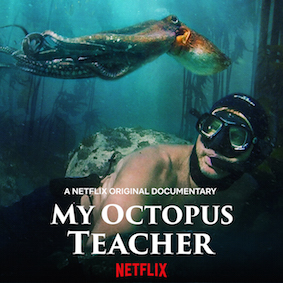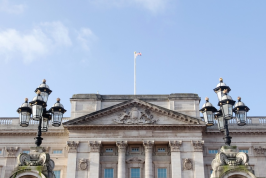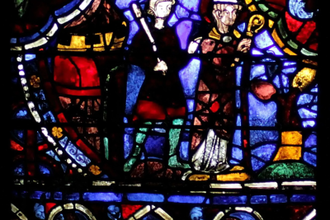Film: My Octopus Teacher

What can be learnt from an octopus? If you watch the mesmerisingly beautiful documentary film 'My Octopus Teacher' you will find out. It will be a humbling experience, and an important one in our times.
One thing I've found over years of outreach on faith and ecology is that the value of other species and the richness of Earth's biodiversity isn't generally appreciated. "We're living through the greatest extinction period since the extinction of dinosaurs," Columban eco-theologian Fr Sean McDonagh warned 17 years ago in his book 'The Death of Life,' but reactions were sometimes marked by indifference and ignorance. Comments I heard ranged from, "Why do we need all this biodiversity anyway?" to "I find bees horrible stingy creatures and I won't miss them," to "don't we Catholics regard life on Earth as a 'veil of tears' and we are directed to focus on our heavenly life?".
There was some change in attitude in 2015, with the encyclical Laudato Si'. It devoted more than 20 pages to the issue of biodiversity. Pope Francis warned of "excessive anthropocentrism." He said, "because of us, thousands of species will no longer give glory to God by their very existence, nor convey their message to us; we have no such right."
David Attenborough has made some headway in recent years, after moving beyond focusing on Earth's wondrous species and habitats to issuing regular warnings about how humanity's actions are threatening the stability of our planet in terms of destroying other species and climate change. There are of course extra imperatives this year, with major international conferences on biodiversity (China, October) and climate change (UK, November) taking place.
But getting back to my review, I would be surprised if "ecological conversion" wasn't sparked by 'My Octopus Teacher'. This unique film, available on Netflix, recently won an Academy Award and BAFTA for best documentary feature. It has a rating of 100% on Rotten Tomatoes. I found viewing it a spiritual experience.
The film doesn't get into environmental warnings. In fact, filmed in a small area of ocean off Cape Town's peninsula in South Africa, the pristine clear and cold waters, unspoilt seabed, underwater kelp forest, teeming numbers of sea creatures and occasional background whale song appear to reassure that all is well in the natural world. There isn't a piece of plastic pollution in sight! It does, however, through powerful storytelling, address something fundamental - humanity's relationship with the natural world. And this should be a key issue for people of faith who understand creation to be a gift from God.
It follows documentary filmmaker Craig Foster as he discovers a common octopus (Octopus vulgaris) in the waters near his home where he freedives daily - without a wetsuit or oxygen tank - to recover from a period of "burnout" in his life. A remarkable man in his own right, he documents most of her life cycle over nearly a year, forming a strong emotional attachment to her and recording the healing effect she has on him.
After several months of engagement with the octopus, the animal clearly recognises him and grows to trust him and it is an emotional moment for viewers as well when she first reaches out and wraps one of her arms around his hand. "I'm being let into the secret world of this wild animal" he reflected. He is amazed at her openness in engagement with him, and her skills. For camouflage she can change colour in an instant and transform the texture of her skin to match surroundings. And what a strategist! We see her wrap herself within kelp to hide from a predator and he remarks that, "I could feel her fear as her eyes peered out from the kelp." We follow her hunting for food and herself being hunted down by a pyjama shark. At one stage she scrambles to the seafloor, speedily attaches shells to her body with her suckers, and rolls up into a ball. The shark is frustrated trying, unsuccessfully, to break through the 'armour', and the octopus suddenly darts away. Viewers can relax again. The octopus isn't so fortunate in another devastating attack and Foster documents her resilience as she recuperates over several weeks. "She overcame her difficulties and slowly her confidence returned," he said, noting that, "in a strange way my life has mirrored hers."
Foster is drawn to the ocean everyday and notices more and more how species interact and the importance of the kelp forest which nurtures ocean life in that area. He learns much from this underwater world - a wild world that operates independent of human society. His reflections reveal the lessons he has learnt and indeed we can all learn. He respects the intelligence of a creature that has more than one brain. She can, for example, drill shells of molluscs to get at the food within. "She has high level invertebrate intelligence," he suggests. Regarded as an anti-social creature, he witnesses her playing with fish and teasing him as she swims alongside and follows him. I'll smile every time I recall the octopus peering out of its den, full of curiosity and expectancy when it sees Foster approach. He respects her patience and her determination to survive. However, she is a "terminal spawner" and as she eventually mates and produces eggs she is doomed to die and sacrifice her life to protect her young. After 324 days of interraction, he accompanies her to the end, reflecting, "I felt incredible pride for this animal."
The friendship in My Octopus Teacher shows viewers that meaningful engagements with the natural world can happen right on our doorsteps. How many of us during lockdown have had a heightened awareness of wildlife in our gardens, parks and countryside. Foster says that, "as my relationship deepened I felt more and more in touch with wild places and she taught me to feel I was part of this place and not just a visitor." Over the year, his son was increasingly sensitised to the environment, "becoming a young marine biologist". In fact, towards the end of the film, young Tom finds a baby octopus and Foster wonders whether it could be an offspring of his octopus teacher. The viewer too feels empathy with this tiny creature with all its octopus potential.
So, Foster, already an experienced wildlife filmmaker, found himself connecting with nature in a deeper way. He has co-founded the Sea Change Trust which calls for South Africa to increase its marine protected areas. "I now realise how precious wild places are" says Foster towards the end of the film. "I care about all the animals - even tiny animals are very important - and we realise how vulnerable they are and, indeed, how fragile all our lives are."
After his daily experience with his octopus teacher Foster felt transformed and healed. "It makes you reflect on the meaning of life and relationships with the natural world, but also with people."
And what can be learnt from an octopus? In Foster's view, its "gentleness".
'My Octopus Teacher', was directed by Pippa Ehrlich and James Reed. Cinematography was by underwater cameramen Craig Foster and Roger Horrocks. Some underwater footage, not in the film, was shown on Blue Planet II, episode 5. Foster's wife, Indian environmental journalist Swati Thiyagarajan, was production manager for the film.
Watch a trailer here: www.youtube.com/watch?v=3s0LTDhqe5A


















